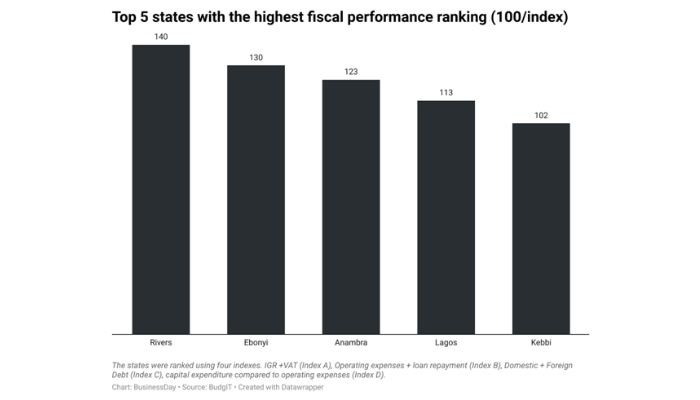Michael Onwuka, Enugu
Ebonyi and Anambra States have been ranked among five states with the best fiscal discipline and prudence in the country, Ikengaonline reports.
According to the 2021 Fiscal Performance Ranking report of states across the federation released by BudgiT, Rivers State topped the overall ranking.
Ikengaonline further reports that BudgiT is a civic organisation that applies technology to intersect citizen engagement with institutional improvement to facilitate societal change.
Meanwhile, other states that made the top five include Lagos and Kebbi states.
According to the report, BudgiT examined state’s fiscal health using four key metrics, namely; the ability to meet operating expenses with Internally Generated Revenue (IGR) and Value Added Tax (VAT).
Other metrics include ability to cover operating expenses and loan repayment with total revenue, how much fiscal room to borrow more and the degree to which capital expenditure was prioritised with respect to operating expenses.
The report stated that the fiscal fundamentals of the five aforementioned states were more prudently managed than those of other states in the country.
“In the overall ranking, two states – Ebonyi and Kebbi – made it as new entrants to the top 5 category . This was driven largely by growth in both states’ IGR as recorded by the Nigerian Bureau of Statistics.
“Ebonyi state grew its IGR by 82.3 per cent from N7.5bn in 2019 to N13.6bn in 2020, while Kebbi state grew its revenue by 87.02 per cent from N7.4bn in 2019 to N13.8bn in 2020,” it stated.
The report noted that Ogun state (now 19th) and Kano state (now 22nd), dropped out of the top 5 category due to a sharp decline in their IGR in 2020.
According to the report, only three states in the country, namely, Lagos, Rivers and Anambra could meet their operating expenses obligations with a combination of their IGR and VAT as measured in ‘Index A’ ranking.
“Cumulatively, the 36 states total debt burden increased by N472.63bn (or 8.78 per cent) from N5.39tn in 2019 to N5.86tn in 2020.
“This was driven largely by exchange rate volatility which saw the value of the naira jump from N305.9/$1 in 2019 to N380/$1 as of December 31st 2020.
“Five states, namely, Lagos, Kaduna, Anambra, Benue and Zamfara accounted for more than half (that is 63.63 per cent or N300.7bn) of the net year-on-year subnational debt increase of N472.63bn for all the states between 2019 and 2020,” it stated.
The report stated that based on each state’s 2020 revenue, five states, namely, Ebonyi, Rivers, Anambra and Cross River in Southern Nigeria and Kaduna in Northern Nigeria, prioritised investment in infrastructure by spending more on capital expenditure than operating expenses.
“Nineteen states, including eight oil-producing states, saw a year-on-year decline in their capital expenditure, while seventeen states were still able to improve their investment in capital expenditure, from 2019 levels despite fiscal constraints induced by COVID-19.
It recommended that states needed to rapidly block financial leakages that could further drain the little available revenue or future revenue.
“From the Annual Performance Assessment (APA) results of states under the State Fiscal Transparency, Accountability and Sustainability (SFTAS) programme released in Q2 2021, only 7 states in Nigeria had functioning Treasury Single Accounts (TSA),” the report stated.

